المراقبة والتقييم
لا تتعلق معظم تحديات الرصد والتقييم، مثل الافتقار إلى الاستثمار والقدرات الكافية، تحديدًا بالمساعدات النقدية والقسائم. لكن تلك التي تتعلق في المقام الأول برصد نتائج عمليات النقل غير المقيدة. ويمكن أن تجعل مرونة التحويلات النقدية من الصعب تحديد مؤشرات النتائج المناسبة، لأنها قد تتضمن مجموعة من المؤشرات القطاعية والشاملة. وفي الوقت نفسه، هناك قيود على جمع بيانات دقيقة حول كيفية إنفاق التحويلات النقدية.
التزم الموقعون على الصفقة الكبرى بضمان وجود آليات الرصد والتقييم ذات الصلة فيما يتعلق بالنقد، وزيادة فهم التكاليف والفوائد والآثار والمخاطر المتعلقة بالنقد بالنسبة للطرائق الأخرى. بناءً على ذلك، يحتوي مسار الصفقة الكبرى على نقاط عمل بما في ذلك تطوير مؤشرات نتائج مشتركة للمساعدات النقدية متعددة الأغراض، ومقاييس لتحليل القيمة مقابل المال. تم تقييد التحليل المنهجي للقيمة مقابل المال بسبب عوامل تشمل عدم وجود نهج متفق عليها، والحاجة إلى بيانات نتائج عالية الجودة، وطبيعة التحليل.
الأولويات الحالية
في إطار الالتزامات النقدية للصفقة الكبرى، شاركت شبكة CALP (مع الوكالة الأمريكية للتنمية الدولية وخدمات الإغاثة الكاثوليكية) في تطوير مؤشرات النتائج للمساعدات النقدية متعددة الأغراض. وتُتاح مسودة الاختبار حاليًا باللغات الإنجليزية والفرنسية والإسبانية عبر مكتبة شبكة CALP.
Related initiatives
Featured content

Multipurpose Cash Outcome Indicators – Final Draft for Testing
Guidelines and Tools
Note that the MPC indicators have now been revised. Please click here to access the updated Multipurpose Outcome Indicators and Guidance, which is available in Arabic, English, French and Spanish. Multipurpose Cash Outcome Indicators – Final Draft for Testing Multipurpose cash (MPC) is a type of assistance intended to enable people to meet their basic needs through local...

Monitoring 4 CTP: Monitoring Guidance for CTP in Emergencies
Guidelines and Tools
This guidance provides a central resource to promote a common understanding of the most important monitoring considerations for humanitarian projects using cash transfer programming (CTP). The primary audience for this guidance is field-level practitioners, from organisations directly involved in the design, implementation, monitoring, and accountability of projects using cash and vouchers...

Cost-Efficiency Analysis of Basic Needs Programs: Best Practice Guidance for Humanitarian Agencies
Guidelines and Tools
The Efficiency, Effectiveness and Value for Money Sub-Workstream is pleased to share the final output on Cost-Efficiency Analysis of Basic Needs Programs: Best Practice Guidance for Humanitarian Agencies (attached).
Cost-efficiency analysis estimates the ratio of program costs to outputs created, allowing you to compare cost-per-output for programs which all produced the same output. Such...
Thematic lead
Latest

Refugee Economies: Rethinking popular assumptions
Report
‘Refugee economies’ remain under-researched and poorly understood and there is a lack of good data available on the economic lives of displaced populations. Existing economic work on refugees tends to focus narrowly on refugee livelihoods or on the impact on host states. Yet, understanding these...

Social transfers in the fight against hunger – A resource for development practitioners
Report
A European Commission Reference Document aims to deepen the understanding of a concept, develop knowledge, provide orientations for aid implementation, and present good practices. This Reference Document is intended as a resource to support the practical integration of social transfers into programmes...

Financing of Cash Transfer Programming
Policy paper
This thematic report has been undertaken as part of a 2013 research study entitled, Is Cash Transfer Programming ‘Fit for the Future’? The research was commissioned by the the CALP Network and undertaken by the Humanitarian Futures Programme (HFP), King’s College London. The overall...
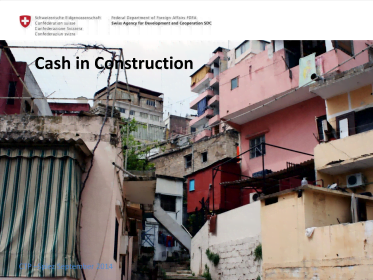
Cash in Construction
Presentation
This Powerpoint was used by SDC during a workshop on CTP and shelter/construction that took place in mid 2014. Click here to download a short introduction Powerpoint on Cash and Shelter from the same event.

The Public Pursuit of Secure Welfare: Background Paper on International Development Institutions, Social Protection & Developing Countries
Report
This paper provides an overview of the development of the conceptual framework underlying social protection programming and policy among the key international development institutions active in this sector. It sets out the historical, institutional and political factors underlying the current debate,...
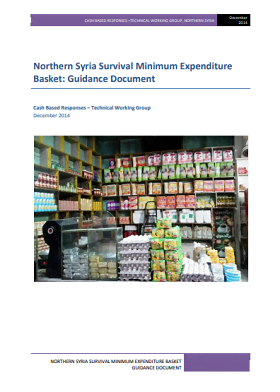
Northern Syria Survival Minimum Expenditure Basket: Guidance Document
Report
The Survival Minimum Expenditure Basket (SMEB) outlines the minimum culturally-adjusted items for survival for a household in Syria for one month. The basket comprises the basic energy requirements of 2,100 kilocalories per person per day, fuel for cooking, and non-food items. The attached guide has been...
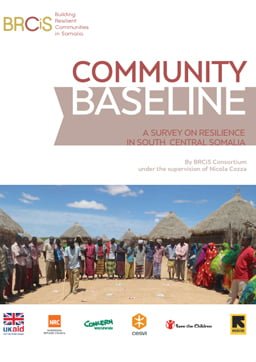
Community Baseline: A Survey On Resilience In South Central Somalia
Report
A comprehensive understanding of the socio-economic and environmental context of intervention is essential to the success of any resilience-building program. Based on this premise, the BRCiS has taken a series of steps to strengthen its knowledge and understanding of key variables and dynamics in its...

Payment Mechanisms and Anti-Poverty Programs: Evidence from a Mobile Money Cash Transfer Experiment in Niger
Report
Cash transfers have become an increasingly important component of social protection policies in both developed and developing countries. While such programs are often implemented electronically in developed countries, in many developing countries with weak financial infrastructure, such transfers are...
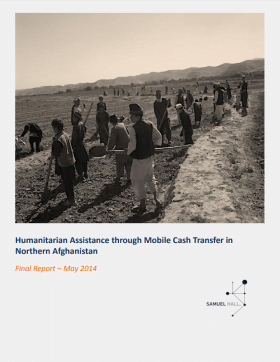
Humanitarian Assistance through Mobile Cash Transfer in Northern Afghanistan: An evaluation of a DFID pilot project in Faryab, Jawzjan, and Samangan
Report
In response to the 2011 severe drought that pushed vulnerable rural households into food insecurity in 14 provinces of Northern Afghanistan, DFID has committed to address emergency needs in northern Afghanistan with nutrition, food security and farming inputs. Samuel Hall Consulting, a Kabul-based...
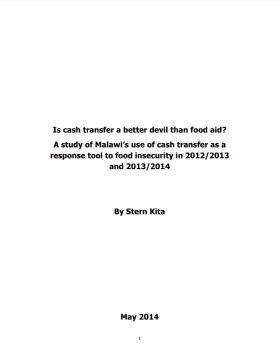
Is Cash Transfer a Better Devil than Food Aid? A study of Malawi’s use of cash transfer as a response tool to food insecurity in 2012/2013 and 2013/2014
Report
The 2004 Indian Ocean Tsunami is considered as the first humanitarian situation where cash transfers were used as an alternative to food aid. Since then, cash transfers have been used as a standalone response tool to disasters, or used in combination with food aid. Malawi piloted the use of cash...

The EU and Social Protection in Africa
Report
The European Report on Development recommends that the EU should make social protection an integral and central component of its development policy. But what can the EU bring to the social protection agenda of African and other developing countries?

Rapid Assessment for Markets (RAM) – Guidelines for an initial emergency market assessment
Guidelines and Tools
In today’s world, people’s livelihoods depend to a significant extent on markets. Sudden shocks can severely limit how markets function and, as a result, drastically reduce people’s access to essential commodities. This International Red Cross and Red Crescent Movement publication is designed to...

Community Baseline: A Survey On Resilience In South Central Somalia Summary
Report
A comprehensive understanding of the socio-economic and environmental context of intervention is essential to the success of any resilience-building program. Based on this premise, the BRCiS has taken a series of steps to strengthen its knowledge and understanding of key variables and dynamics in its...
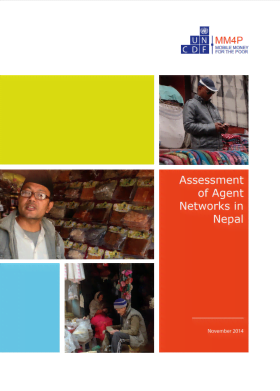
Assessment of Agent Networks in Nepal
Report
This report focuses on assessing the existing agent networks in Nepal, so that the correct steps can be taken to popularise both access to and use of financial services through bank-led agent banking. After the release of electronic banking regulations in 2012, many financial institutions began...
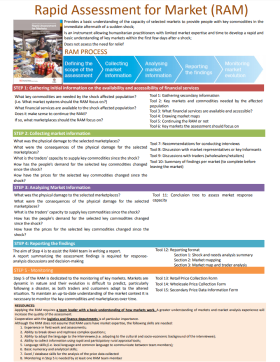
Poster – Rapid Assessment for Market (RAM)
Guidelines and Tools
This poster provides a basic understanding of the capacity of selected markets to provide people with key commodities in the immediate aftermath of a sudden shock. It is an instrument allowing humanitarian practitioners with limited market expertise and time to develop a rapid and basic understanding of...
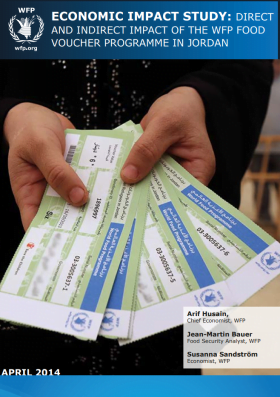
Economic Impact Study: Direct and indirect impact of the WFP food voucher programme in Jordan
Report
The intent of this study is to estimate the economic benefits of the food voucher programme implemented by the World Food Programmeme (WFP) for Syrian refugees in Jordan. The study employs a two pronged approach whereby the first component provides an analysis of the supermarkets that participate in...

Does one size fit all? The Conditions for Conditionality in Cash Transfers
Presentation
Created in the early 1990s in Latin America, Conditional Cash Transfer programmes (CCTs) are now at the forefront of the international policy debate as one of the most effective social interventions for tackling poverty in developing countries. However, if CCTs have been successful in achieving some of...
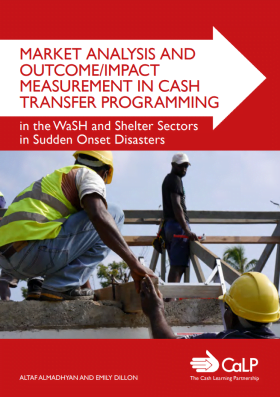
Economic Impact Study: Direct and Indirect Effects of the WFP Value-Based Food Voucher Programme in Lebanon
Report
This study examines the direct and indirect impacts of WFP’s e-card programme on the Lebanese economy. It is part of a broader United Nations initiative to assess the economic impacts of humanitarian assistance in Lebanon. The e-card programme is an important element of the international humanitarian...

Cash transfer programming – an introduction (low resolution video)
Video
Since 2010, the European Commission’s Humanitarian Aid and Civil Protection department has been supporting a partnership between IFRC, the CALP Network and British Red Cross. The partnership seeks to use cash where it’s appropriate and to help ensure that the humanitarian community has the skills...

Support to the local tool market post-Typhoon Haiyan
Report
Super Typhoon Haiyan struck Leyte and Eastern Samar in the Philippines in November 2013. CRS responded by initiating a program in 2014 to support the livelihoods recovery of 5,250 agriculture-based households. The Livelihood Early Recovery Support to Agricultural Households Affected by Typhoon Yolanda...
